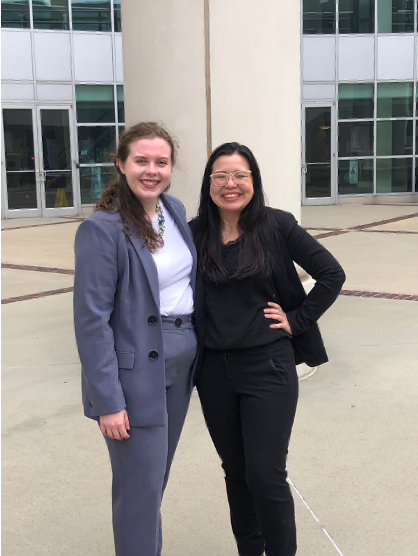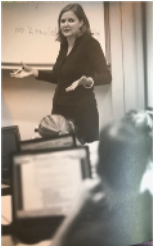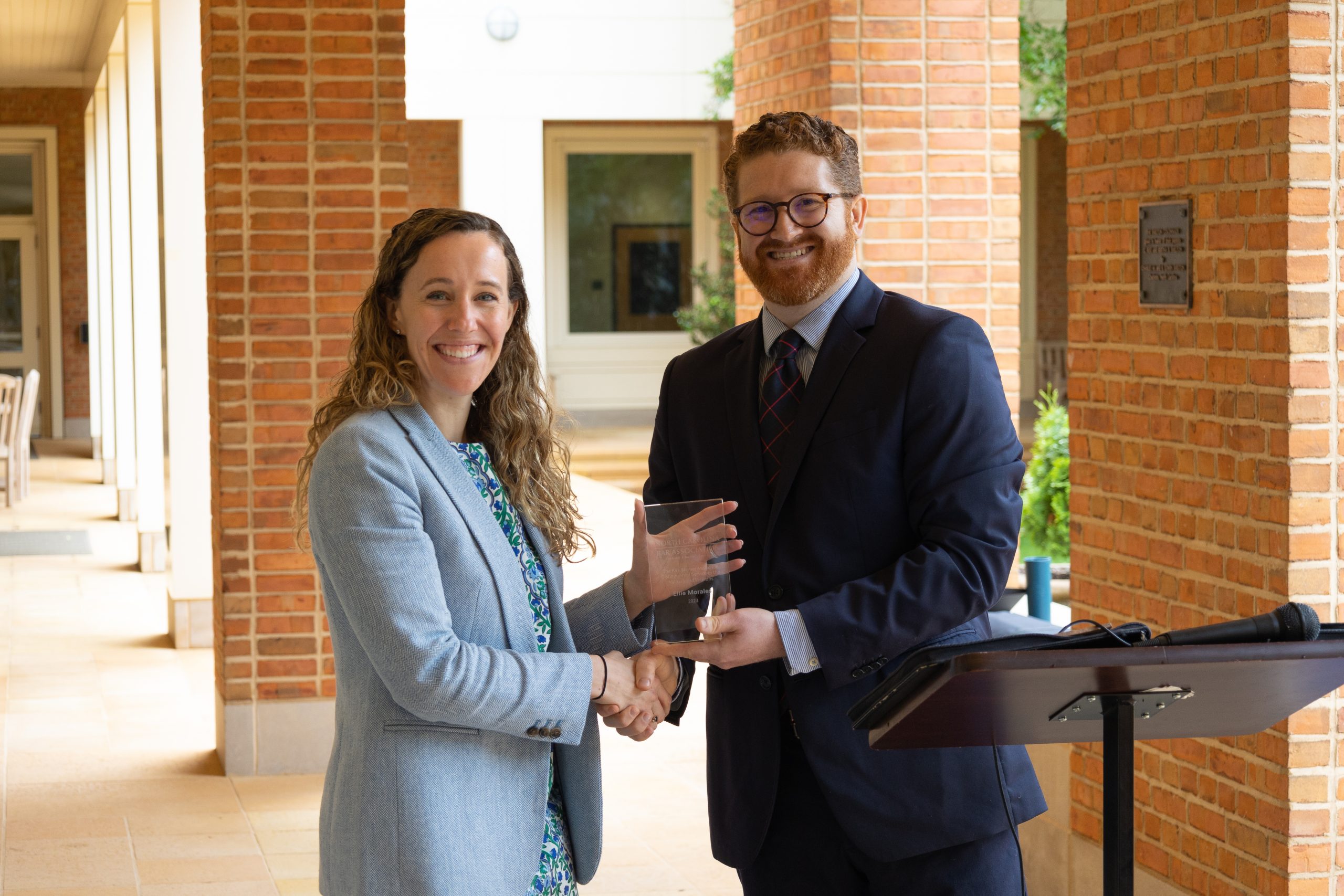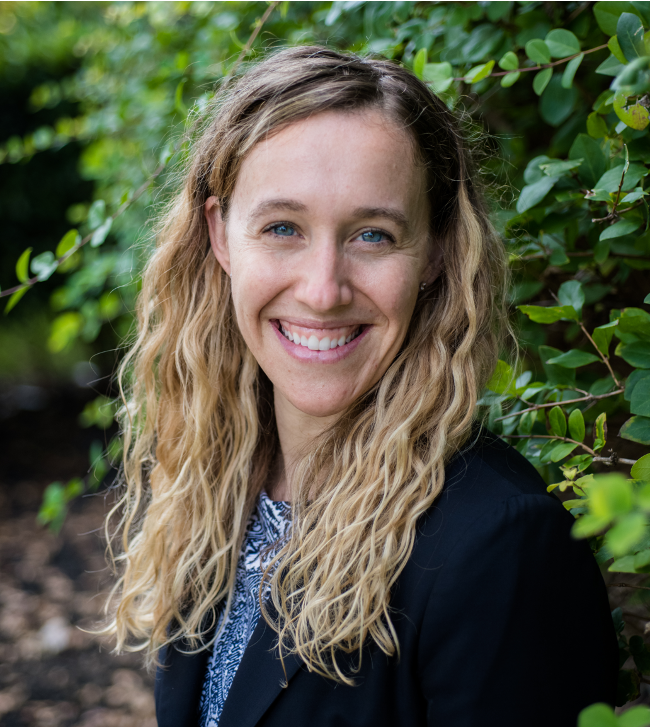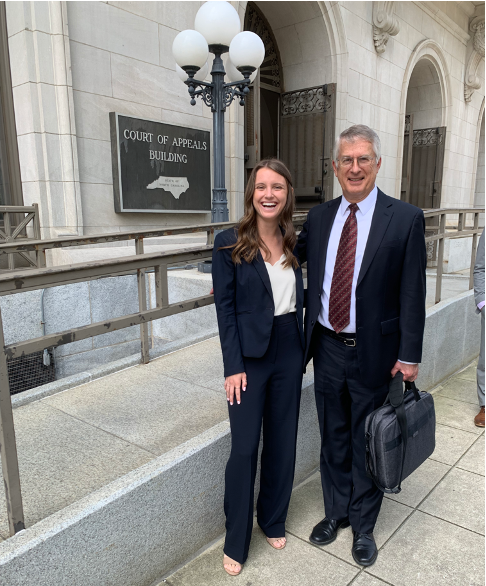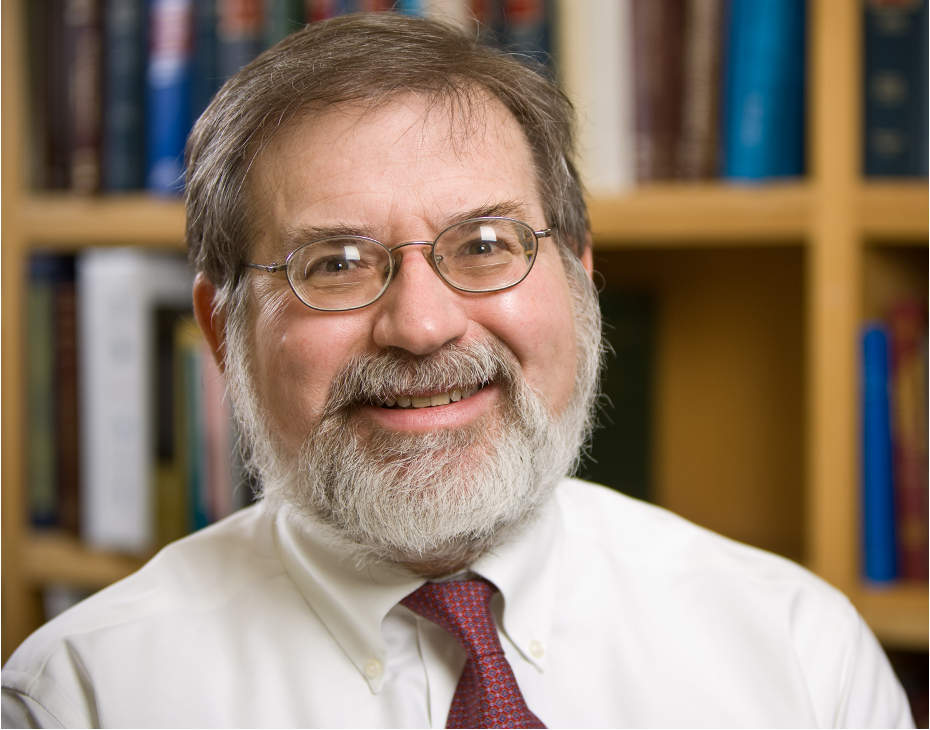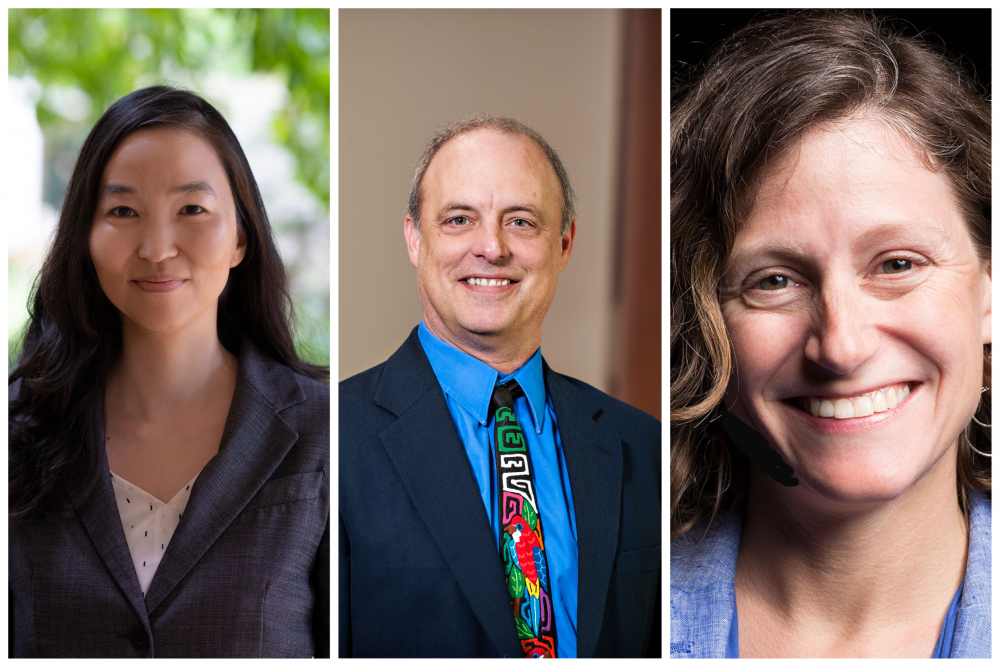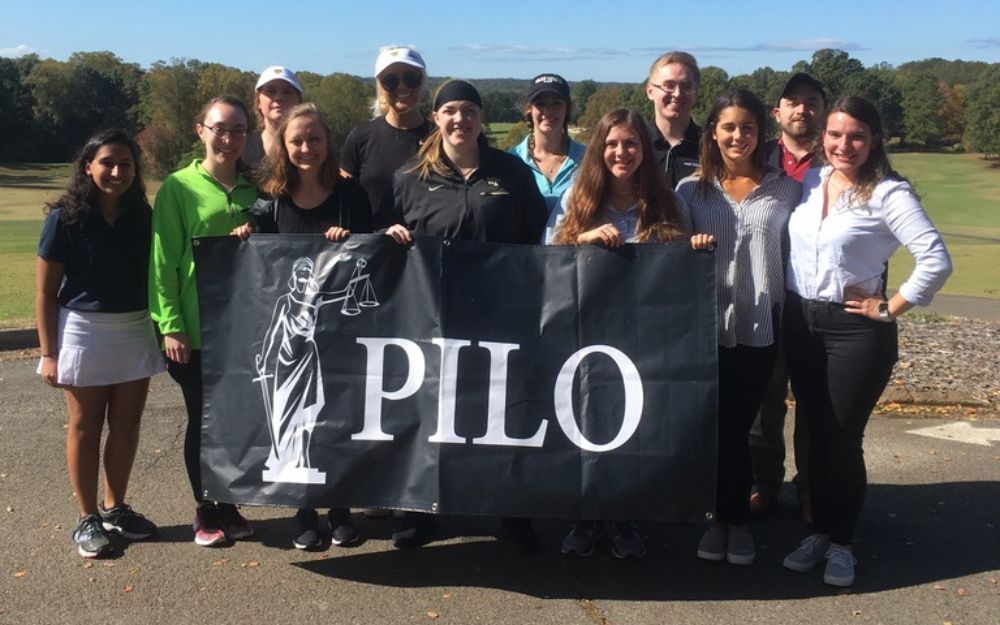Professor Emeritus Ralph Peeples passed away on Friday May 12th from complications associated with late stage lung cancer. He was 71 years old.
Professor Peeples joined the Wake Forest Law faculty in 1979. He was an expert in business law, dispute resolution, and torts, among other subjects. He also served as the Associate Dean for Academic Affairs from 1995 to 2000.
A distinguished and beloved teacher and scholar, Professor Peeples was a four-time winner of the Excellence in Teaching Award at the Law School. When he retired in 2018, alumni “returned in droves” to honor and recognize his decades of service to Wake Forest Law. He was known for his excellent rapport with students, close camaraderie with his fellow faculty members, and of being a part of the “Fab 5”—five revered professors who all retired in the same year (Professors Miles Foy, Charley Rose, George Walker, and Dean Emeritus Bob Walsh).
Beyond his contributions to the Law School, he had many interests. According to a 1979 Jurist article, “The professor’s personal interests include woodworking, music (from Willie Nelson and Jackson Brown to Louis Armstrong), and a newfound affection for racquetball.” His love of the Cleveland Indians was known far and wide. But his greatest passion was his family: his wife Faith Crosby and their four children, and his many relatives.
Professor Peeples was chosen by the Class of 2018 as the faculty speaker for that year’s Hooding and Commencement Ceremony. In his address to the students, he remarked, “The one thing I have known over the years at Wake Forest, for a law school full of bright and ambitious young people, the one thing that doesn’t change is that lifelong friendships are made here. I am confident these students will remain friends after Wake Forest and I am confident because I have seen it again and again. It will happen and I think it’s great. I think that’s what makes Wake Forest different.”
But it was not only friendships among the students that made Wake Forest Law a special place for Professor Peeples—it was the friendships that he himself made with his peers. And who better to honor Professor Peeples than his friends and colleagues, those he had such a deep and lasting impact on. Professor Peeples will be deeply missed, but always remembered as a cherished part of the Wake Forest Law community.
***
Honoring Ralph Peeples
“I’ve always looked up to Ralph Peeples as a teacher, scholar, and friend. I was fortunate enough to have him as a professor back in my own days as a Wake law student. We often laughed about his reaction after I went to his office and asked him the exact question on the exam. Ralph continued to provide support and a listening ear, along with appropriate sarcasm, when I was a practicing attorney, and welcomed me on the faculty when he served as Associate Dean, again along with his characteristic sarcasm that always made me laugh. As a fellow Clevelander, also living in Greensboro and commuting to Winston-Salem, we were able to engage in many meaningful conversations about Wake law, our students, and why Cleveland Indians’ Stadium Mustard is greater than Dijon. Even this past semester, he continued to be involved in the lives of Wake Law students and spoke with one of my students about food insecurity in Winston-Salem, and his work with Harvest Market, which is making a difference in the lives of many in our community. Most of all, I recall our conversations about the importance of family, a topic we spoke about frequently. Our world is a bit dimmer with Ralph’s passing. His impact was profound.”
– Professor Christine Coughlin
*
“Ralph was my friend for over 40 years. He loved and loved to talk about music, literature, politics, sports (with special emphasis on the Cleveland Indians), Davidson, his students and the law school. He was brilliant; he knew and saw things that most of us missed and his sense of humor, quick, subtle, often understated was there in every conversation. He wrote with the same intelligence and humor as he spoke and his articles are a pleasure to read. He adored his family, his wife, Faith, and his four children, Kate, Sam, Michael and Emma. He was the oldest of six children and was close to his siblings throughout his life. Ralph was the strongest and best person I have ever known. His strength was apparent over the years when he and his family dealt with some serious health challenges. He never complained, never descended into self pity but faced each issue with a calm strength and remarkable courage. His great character and goodness were shown over and again by his selflessness. Never one to blow his own horn he worked tirelessly on behalf of others because he believed that to be the right thing to do. It was hard to pay Ralph a compliment; he was far too willing to avoid the recognition that he deserved. After he retired he volunteered to serve as general counsel of a group trying to bring a food cooperative to an area of Winston described as a food desert. He worked tirelessly and successfully to make the co-op a reality and it is operating successfully today. In all the publicity surrounding its opening and operation his name was never mentioned. I told him this was an injustice. He disagreed. It was enough that the effort succeeded. That was Ralph Peeples.”
– Professor Emeritus Butch Covington
*
“Ralph will be remembered by many as a colleague, friend, and community servant. Following his retirement, Ralph endured the rigorous training of Read Winston-Salem so that he could serve as a reading tutor. He was also instrumental in the development of a food co-op that serves residents of a food-desert area in southeast Winston-Salem. He will be missed.”
– Professor Tim Davis
*
“Ralph Peeples embodied all of the good things that really matter in the life of a law school. He cared deeply about his students and his colleagues. He was honest and kind. He valued justice almost to a fault. He was intolerant of hypocrisy and cant. He labored through the heat of the day to make Wake Forest a better place. And beyond his purely professional virtues, he was, for me, the dearest of friends. I met him when I joined the faculty in 1984. His delightful wit, his personal warmth, his love of lively conversation, his divergent interests, all of these things made it a pleasure simply to be in his company. His friendship over these last 39 years was one of the treasures of my life.”
– Professor Emeritus Miles Foy
*
“I first met him as a student in his bankruptcy class in Fall 1993. He was a great teacher, and later, I enjoyed hearing my 1Ls tell stories about his Torts class. He was a real legend.”
– Professor Laura Graham
*
[Ralph] was always a joy to work with. I was always glad to see him walk into a meeting I was in, and even gladder when I got to sit next to him. His side commentary was worth sitting through pretty much any meeting. I’ve often wondered in the last few years ‘What would Ralph say?’ and I’m sure I’ll keep wondering & missing his wisdom & wit.
– Kate Irwin-Smiler, Reference Librarian
*
“Ralph was on the Appointments Committee when I was hired. He asked me one question in my DC screening interview—would I be able to leave the Big Ten for the ACC? And then, as always, he laughed. When I arrived at Wake in 2010, I was lucky enough to get an office a few doors down from Ralph. That meant I got nearly daily conversations with him. Ralph was an outstanding teacher and innovative scholar. He mentored junior faculty the way I’m sure he mentored students. He was wise, he was good, he was kind, and he was funny. He left Wake Forest and the world a better place.”
– Professor Tanya Marsh, Associate Dean for Academic Affairs
*
“I was lucky enough to teach with Ralph in Venice, in the summer of 2012. The students were expected to arrive in Venice on a Sunday, and classes started Monday morning. We knew they would be jet-lagged, tired, hungry, and disoriented, so we had pizza ready for them when they arrived. Pizza was an inspired choice because, for law students, pizza is not only the perfect main meal, it is also the perfect breakfast.
One of the perks of teaching in Venice was the Student Assistant-—typically a student at the local university. She knew Venice, she knew Italian, and she was fluent in English. Sometimes, those skill sets could come in handy.
Our Assistant popped in unexpectedly, while we were having pizza. She was taken aback, and a little defensive. She said, ‘How was I to know there was a party going on?’
Naturally, Ralph and I broke into song. Here’s what we sang:
‘Splish splash, I was taking a bath, all upon a Saturday night
Rub dub, I was relaxing in the tub, thinking everything was all right.
Well I got out of the tub, put my feet on the floor
Wrapped a towel around me, and opened the door, and well
Splish splash, I jumped back in the bath
[…and here’s the crucial lyric..]
How was I to know there was a party going on?’
‘Splish splash’ had been a hit more than fifty years before, and that was all I remembered of it. But not Ralph. He knew the whole thing. He knew what dance they were doing at the party:
‘Flip flop, they was doing the Bop.’
He knew the entire guest list:
‘Bing bang, I saw the whole gang…
There was Lollipop, Peggy Sue
Good Golly Miss Molly was even there too.’
That’s the thing about Ralph. He was a terrific human being. We will all miss him dearly. And, he had this unique attribute: Ralph knew stuff. Lots of stuff. Stuff that you might have thought was unimportant, even silly. But then, the day would come when you really, really needed to know that stuff, and nobody knew it.
Except Ralph. You’d go to him and say, ‘I know it’s a long shot, but do you happen to know…’
Ralph would smile quietly, say ‘Sure,’ and save the day. Again.
In this respect, Ralph was kind of a Renaissance Man. And where better to be a Renaissance Man than Venice?
And, you may ask, what of the Student Assistant? She stood there, quietly listening. Then she said, ‘You know, you two are a little bit different from the other Wake Forest Professors I’ve met.’”
-Professor Emeritus Joel S. Newman
*
“Ralph meant a lot to me. We were buddies—he had my back and I his. I liked so much when he called me by my last name. I carry many of our conversations in my heart. Toward the end of his stint as associate dean, he said to me, ‘The most important thing this job has taught me is that our students have lives—many of them difficult lives.’ Ralph’s compassion was hard-wired. So was his sense of humor. Ralph’s humor was full-body humor, with grandiose gestures and laughter that came from the belly. It was a facet of his compassion.”
– Professor Alan Palmiter
*
“Ralph Peeples was a man of love and action. I had the privilege of ‘crashing’ his Last Class, and his students were just beaming with love for him. May his light be an inspiration for all of us.”
– Professor Wendy Parker
*
“The Cleveland Indians did not have a winning record from 1986 to 1994. At long last, headed to the playoffs in 1994, the season ended prematurely when contract negotiations broke down and the players went on strike. The Indians went on to win their division by 30 games in 1995, only to lose to the Atlanta Braves in 7 games in the World Series. They entered the 1997 World Series as prohibitive favorites, only to lose to the upstart Florida Marlins. Such is the life of an Indians fan—and there was none more loyal than Ralph.
He further engaged his penchant for masochism as he sat next to me at Wake Forest football games for lo these many years. As we watched opponent after opponent convert on 3rd and 25, Ralph’s wry sense of humor always made me glad I had spent the afternoon with him, regardless of the misery we had endured watching the “_emon Deacs” (no “D” for the non-football fans!).
Ralph’s ultimate agony occurred in 2010 when, as the mastermind who had constructed the mighty We The Peeps franchise in our baseball fantasy league, he lost in the playoffs due to falling .0001 points short in team batting average. Yet, he always came up smiling.
When Ralph confronted systemic problems (outside of sports!), whether at the Law School, in Winston-Salem, or in the world, he truly believed it was better to light a candle—no matter how small—than to curse the darkness. He brightened the lives of all he met. May we honor his memory by striving to do the same.”
-Professor Wilson Parker
*
“Ralph and I joined the Wake Forest Law faculty about the same time, but I always felt that he mastered teaching, scholarship, and being a helpful colleague far sooner and far better than I did. Mind you, I never told him that. No, our shtick—especially at faculty meetings—involved trading insults. Colleagues who didn’t know the routine were shocked, but the twinkle in Ralph’s eyes gave us away. Privately, I had nothing but admiration for my amazing friend. I know personally what a fabulous teacher Ralph was. While publishing empirical articles with him, Ralph taught me how to use statistical programs to analyze data. I learned that this man who routinely won Trivial Pursuit competitions, knew the relevant stats in every sports season, quoted Yeats, and conversed about any genre of music, crunched numbers with the best of them. While he could talk knowledgeably on any subject, he was never more eloquent than on the topics of Faith, Kate, Sam, Emma, and Michael. In every setting, he gave freely of that prodigious mind, sharpest of wits, and generous spirit. And he had so much more to give.”
– Dean Emerita Suzanne Reynolds
*
“The most honest tribute to Ralph is that he was a truly authentic human being! He was the same Ralph Peeples whether he was teaching a class, participating in a faculty discussion, traveling to Cleveland for a baseball game, or reminiscing about old times. His dry humor, his sharp intellect, and his keen sense of the moment was ever present. He was truly committed to his students as well as to his empirical research. It was my genuine pleasure to serve with Ralph for his years at Wake.”
– Professor Emeritus Charley Rose
*
“Ralph will be missed by many. He was kind, genuine, impactful, and reflected the best of Wake Law. He was a great colleague and an even better person. As a member of the Faculty Appointments Committee, he helped recruit me to Wake. Years later I occupied an office next to his. I recall wide-ranging conversations concerning alternative dispute resolution, predictions about Warren Buffet’s future success, and the status of Cleveland sports. I will fondly remember his enthusiasm, wit, and distinctive laugh that was full of life.”
– Professor Omari Scott Simmons
*
“Ralph Peeples was one of the all-time great Wake Forest faculty members. Ralph was an extremely bright, kind, and caring person. He was a faculty leader and beloved by his students and colleagues. His student faculty evaluations were at the highest level as was evidenced by his winning the teaching excellence award four times. He had a wonderful sense of humor that could often bring discussions back into focus. In his scholarship, Ralph was an early advocate of alternative dispute resolution and had a tremendous effect in bringing mediation to North Carolina earlier than other states. When he was Executive Academic Associate Dean, it was a pleasure to work with him every day. If the Cleveland Guardians win the World Series in the next few years, I know it will be because of Ralph’s advocacy in heaven. I know that all who knew him will miss him greatly.”
– Dean Emeritus Bob Walsh
*
“I will miss Ralph. Like others, I appreciated his laugh. I also remember him as a great listener. That’s probably one reason why he was such a great mediator and a great teacher. He could listen intently and help you see something new about what you thought you wanted or what you thought you knew. And I remember Ralph as loyal. After three short years as a big firm associate in Cleveland, he developed a lifelong passion for the Cleveland Indians (later Cleveland Guardians) baseball team. Ralph and Charley Rose led more than a few faculty road trips to Cleveland to see a game at the Jake. His loyalty also shone whenever he reminded me of the duties of membership in the Ex-Academic-Associate-Deans Club. To my knowledge, Ralph never said ‘No’ to a request from an Academic Associate Dean. Ralph is gone too soon. He had a lot more good left to do.”
– Professor Ron Wright
*
Read Professor Ralph Peeples’ obituary here.
